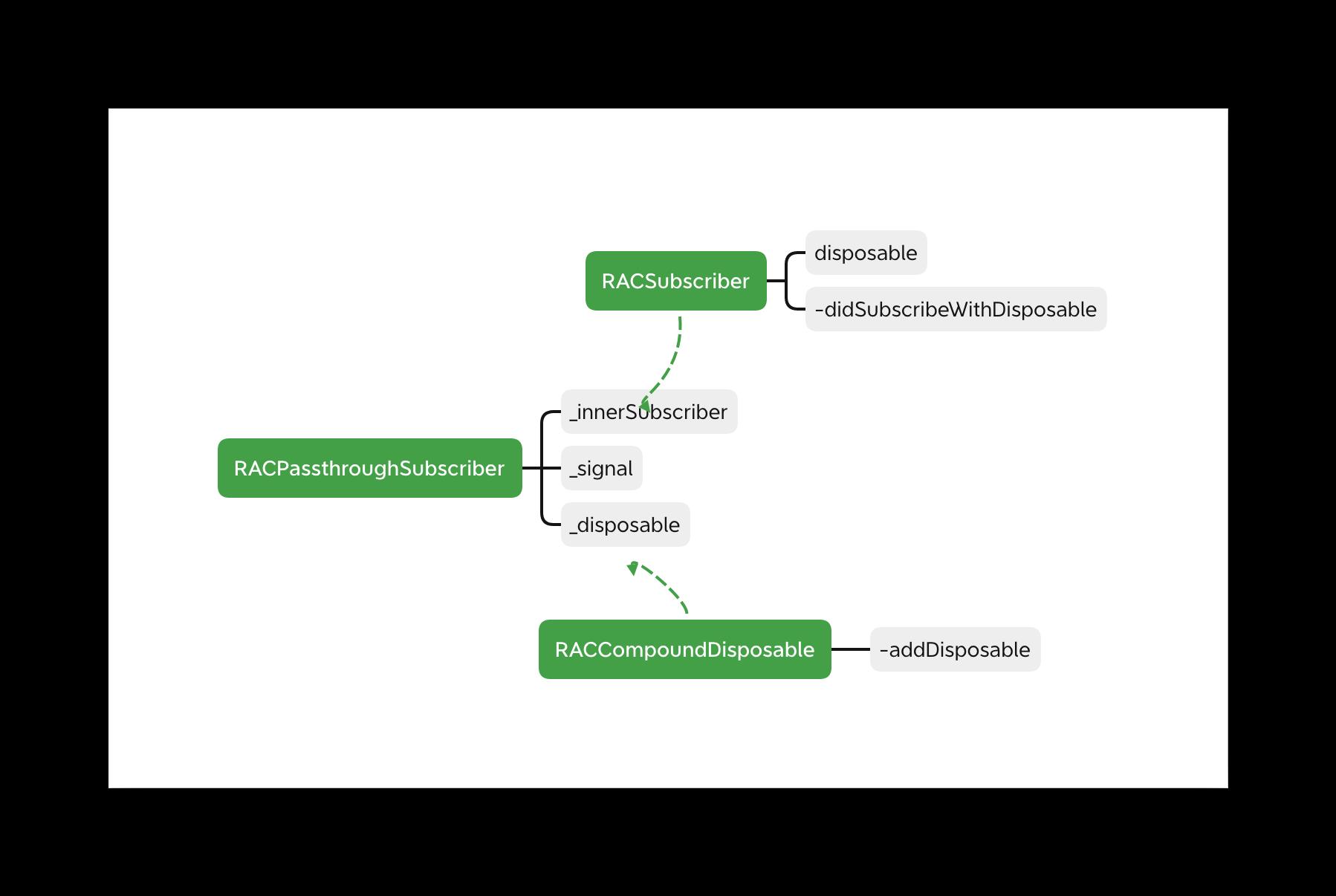RACDisposableRACSubscriber
Posted 王飞飞不会飞
tags:
篇首语:本文由小常识网(cha138.com)小编为大家整理,主要介绍了RACDisposableRACSubscriber相关的知识,希望对你有一定的参考价值。
在了解RAC的过程中,RACSignal的工作处理流程中,少不了RACDisposable和RACSubscriber的参与。本文通过前文的使用代码、解读源码,来探索RACDisposable和RACSubscriber的工作原理。
RACDisposable
- 翻译
disposable
英 [dɪˈspəʊzəbl] 美 [dɪˈspoʊzəbl]
adj.
可任意处理的;一次性的;用后即丢弃的;可动用的;可自由支配的
n.
〈美口〉使用后随即抛掉的东西(尤指容器等)
- 使用
- (RACSignal *)signalTest {
RACSignal *signal = [RACSignal createSignal:^RACDisposable *(id<RACSubscriber> subscriber) {
NSLog(@"this is create block");
[subscriber sendNext:@"发送Next"];
RACDisposable *testDisposable = [RACDisposable disposableWithBlock:^{
NSLog(@"this is dispose creat block");
}];
return testDisposable;
}];
RACDisposable *disposable = [signal subscribeNext:^(id x) {
NSLog(@"this is subscribe block %@",x);
}];
[disposable dispose];
return signal;
}这段代码中出现了2个disposable,RACSignal的didSubscribe 中返回的disposable,RACSignal的subscribeNext方法的返回的disposable。这两个一个是往RACSignal内部传入一个disposable,一个是内部返回一个disposable,很容易给人一种是同一个disposable的错觉,经过打印地址,可以发现并不是同一个disposable,那其中有什么联系么?或者说这内部做了什么操作呢?
- 源码
先看看RACDisposable的初始化方法吧
- (id)initWithBlock:(void (^)(void))block {
NSCParameterAssert(block != nil);
self = [super init];
if (self == nil) return nil;
_disposeBlock = (void *)CFBridgingRetain([block copy]);
OSMemoryBarrier();
return self;
}初始化方法很简单,就是吧block存起来。那这个block在什么时候调用呢?
1.RACDisposable的dispose方法
2.RACSubscriber的dealloc方法
//1.在 RACDisposable中
- (void)dispose {
void (^disposeBlock)(void) = NULL;
while (YES) {
void *blockPtr = _disposeBlock;
if (OSAtomicCompareAndSwapPtrBarrier(blockPtr, NULL, &_disposeBlock)) {
if (blockPtr != (__bridge void *)self) {
disposeBlock = CFBridgingRelease(blockPtr);
}
break;
}
}
if (disposeBlock != nil) disposeBlock();
}
//2.在 RACSubscriber中
- (void)dealloc {
[self.disposable dispose];
}接下来再看看RACSignal的subscribeNext方法中返回的RACDisposable的来源。
// subscribeNext方法里面调用subscribe方法,所以直接来到subscribe这个方法中来
- (RACDisposable *)subscribe:(id<RACSubscriber>)subscriber {
NSCParameterAssert(subscriber != nil);
//新建一个RACCompoundDisposable作为返回值。
RACCompoundDisposable *disposable = [RACCompoundDisposable compoundDisposable];
subscriber = [[RACPassthroughSubscriber alloc] initWithSubscriber:subscriber signal:self disposable:disposable];
if (self.didSubscribe != NULL) {
RACDisposable *schedulingDisposable = [RACScheduler.subscriptionScheduler schedule:^{
//didSubscribe Block返回来的disposable
RACDisposable *innerDisposable = self.didSubscribe(subscriber);
//添加到要返回的disposable中
[disposable addDisposable:innerDisposable];
}];
[disposable addDisposable:schedulingDisposable];
}
//直接返回
return disposable;
}这里看到返回的disposable和didSubscribe Block返回的innerDisposable并不是一个。也验证了使用代码中两个RACDisposable不是同一个了。
RACSubscriber
- 使用
同RACDisposable的使用,在RACSignal的didSubscribe Block中作为回掉参数,可以使用send Next方法。
- 源码
didSubscribe中的subscriber类型为RACPassthroughSubscriber,所以来到RACPassthroughSubscriber的 sendNext方法中
- (void)sendNext:(id)value {
if (self.disposable.disposed) return;
if (RACSIGNAL_NEXT_ENABLED()) {
RACSIGNAL_NEXT(cleanedSignalDescription(self.signal), cleanedDTraceString(self.innerSubscriber.description), cleanedDTraceString([value description]));
}
[self.innerSubscriber sendNext:value];
}继续往里面蹭
- (void)sendNext:(id)value {
@synchronized (self) {
void (^nextBlock)(id) = [self.next copy];
if (nextBlock == nil) return;
nextBlock(value);
}
}这里执行了nextBlock。
我们看看初始化方法
+ (instancetype)subscriberWithNext:(void (^)(id x))next error:(void (^)(NSError *error))error completed:(void (^)(void))completed {
RACSubscriber *subscriber = [[self alloc] init];
subscriber->_next = [next copy];
subscriber->_error = [error copy];
subscriber->_completed = [completed copy];
return subscriber;
}我们在来看看RACPassthroughSubscriber的初始化方法
- (instancetype)initWithSubscriber:(id<RACSubscriber>)subscriber signal:(RACSignal *)signal disposable:(RACCompoundDisposable *)disposable {
NSCParameterAssert(subscriber != nil);
self = [super init];
if (self == nil) return nil;
_innerSubscriber = subscriber;
_signal = signal;
_disposable = disposable;
[self.innerSubscriber didSubscribeWithDisposable:self.disposable];
return self;
}- (void)didSubscribeWithDisposable:(RACCompoundDisposable *)otherDisposable {
if (otherDisposable.disposed) return;
RACCompoundDisposable *selfDisposable = self.disposable;
[selfDisposable addDisposable:otherDisposable];
@unsafeify(otherDisposable);
// If this subscription terminates, purge its disposable to avoid unbounded
// memory growth.
[otherDisposable addDisposable:[RACDisposable disposableWithBlock:^{
@strongify(otherDisposable);
[selfDisposable removeDisposable:otherDisposable];
}]];
}在往里看
- (void)addDisposable:(RACDisposable *)disposable {
NSCParameterAssert(disposable != self);
if (disposable == nil || disposable.disposed) return;
BOOL shouldDispose = NO;
OSSpinLockLock(&_spinLock);
{
if (_disposed) {
shouldDispose = YES;
} else {
#if RACCompoundDisposableInlineCount
for (unsigned i = 0; i < RACCompoundDisposableInlineCount; i++) {
if (_inlineDisposables[i] == nil) {
_inlineDisposables[i] = disposable;
goto foundSlot;
}
}
#endif
if (_disposables == NULL) _disposables = RACCreateDisposablesArray();
CFArrayAppendValue(_disposables, (__bridge void *)disposable);
if (RACCOMPOUNDDISPOSABLE_ADDED_ENABLED()) {
RACCOMPOUNDDISPOSABLE_ADDED(self.description.UTF8String, disposable.description.UTF8String, CFArrayGetCount(_disposables) + RACCompoundDisposableInlineCount);
}
#if RACCompoundDisposableInlineCount
foundSlot:;
#endif
}
}
OSSpinLockUnlock(&_spinLock);
// Performed outside of the lock in case the compound disposable is used
// recursively.
if (shouldDispose) [disposable dispose];
}这里注意这里也有dispose方法,所以Disposable的block在这里应该也是有可能触发的。
- 图解
根据以上的源码,这几个类的关系已经浮出水面了。这里逻辑比较绕,多看几遍源码才能理解。

这里有几点需要注意
1.RACPassthroughSubscriber不是RACSubscriber的子类,两者同遵循RACSubscriber协议
2.RACSubscriber的didSubscribeWithDisposable方法,暂时理解为捕获disposable。其中直接调用selfDisposable 的addDisposable方法。selfDisposable也是RACCompoundDisposable类型的,RACCompoundDisposable中有_inlineDisposables数组,这里应该是吧传入的disposable存起来了。
以上是关于RACDisposableRACSubscriber的主要内容,如果未能解决你的问题,请参考以下文章